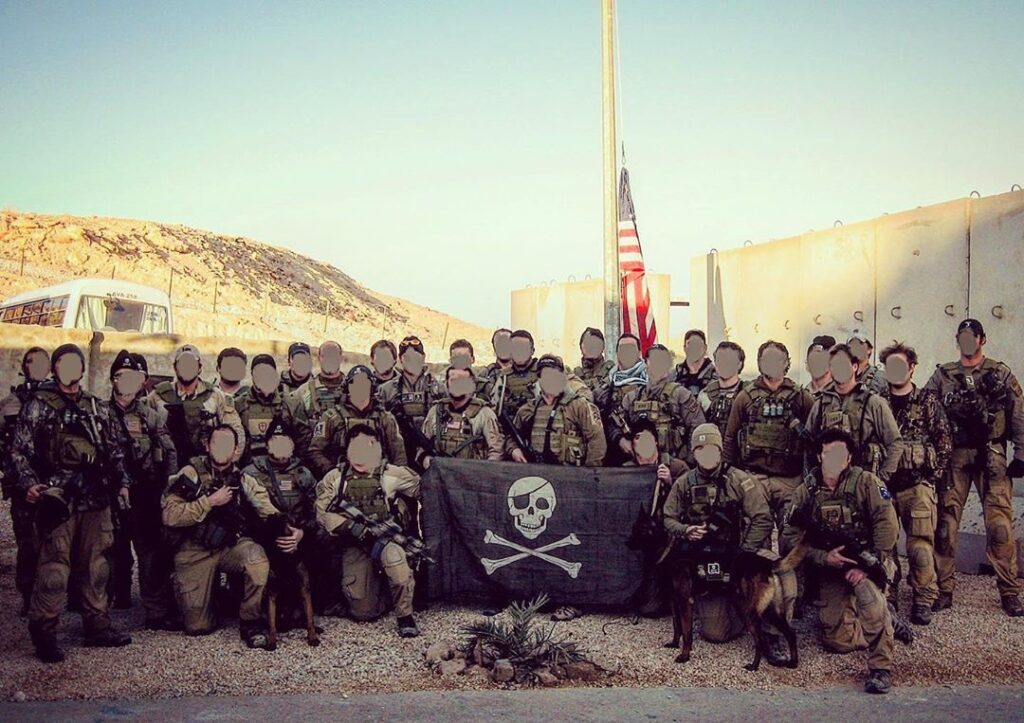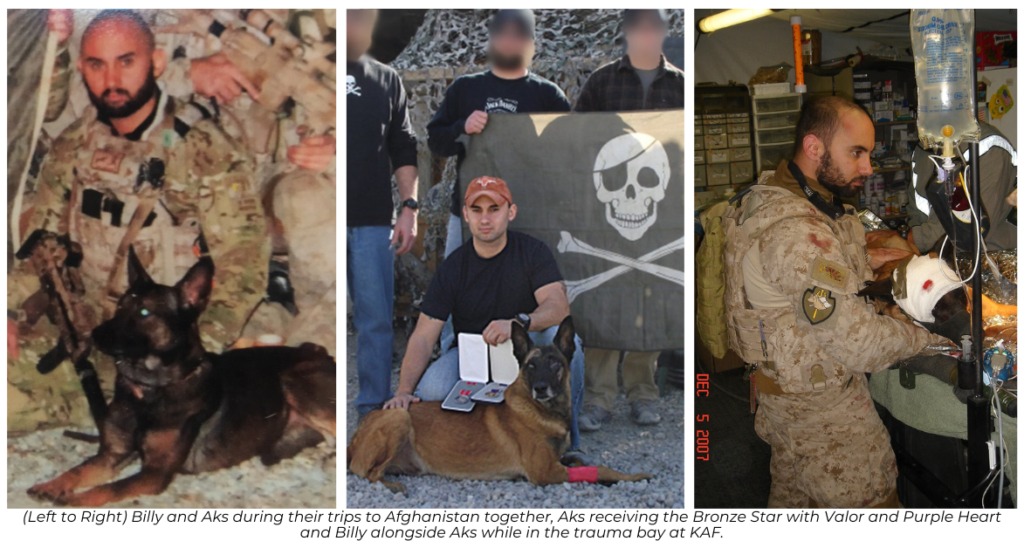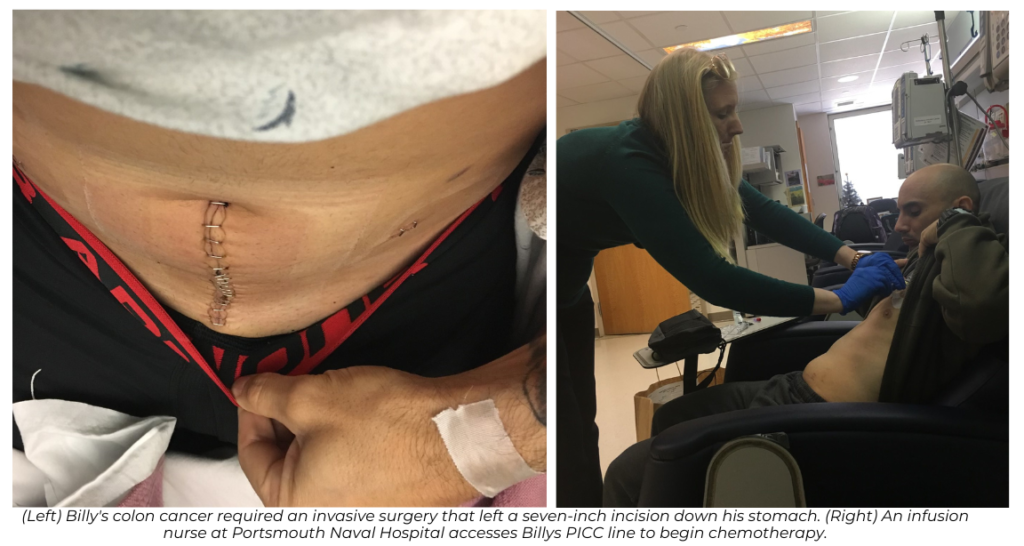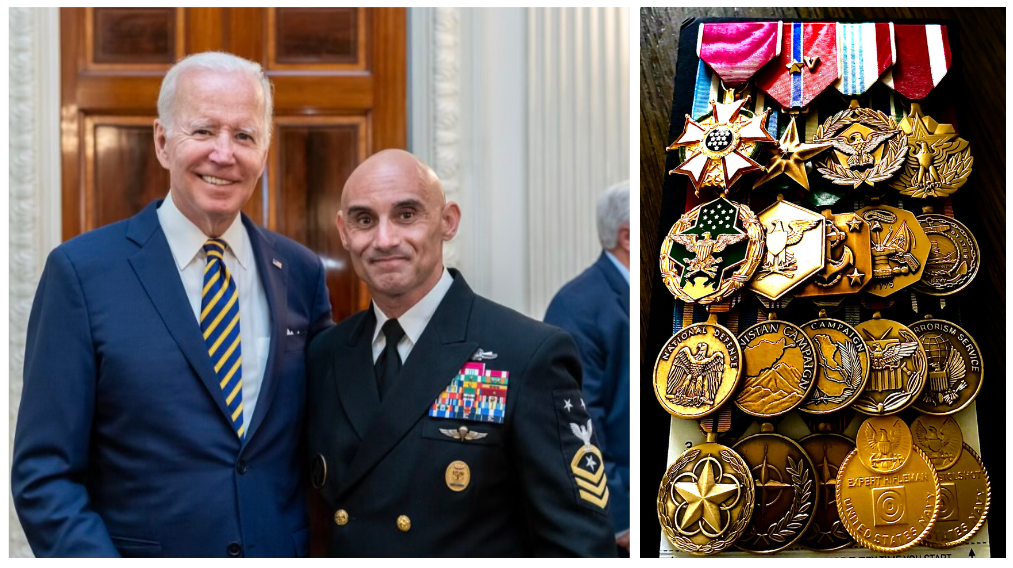March 13, 2023
Today is K9 Veterans Day! And there is no more of fitting story than that of Navy Special Operations dog handler, CMC (ret.) William Clark and his working dog, Aks, and their time at Naval Special Warfare Development Group (DEVGRU).
A little backstory about William “Billy” Clark – he knew he wanted to serve, but more importantly, he knew he wanted to work with dogs. He came from a military family, his mother being one of the first women to serve in Army Airborne, and his father being a Marine door gunner in Vietnam, switched over to the Army, where he served until retirement as a Command Sergeant Major. He enlisted into the Marine Corps reserve as a field radio operator in 1997 until he watched the events unfold on September 11, 2001, with his college roommates.
He knew, being a reservist, that war was about to kick off and he would be activated, but he didn’t want to be a radio operator; he wanted to get into the fight; he knew he wanted to work with military dogs as they had been such a big portion of his life growing up. Billy went to the Marine Corps recruiter and asked to reclassify his military occupation to military police, specifically to handle dogs, and subsequently go onto active-duty status. The Marine Corps said they were overstaffed, so Billy approached Navy recruiting.
The Navy snagged Billy up right away, and within a week, he was in Navy training, Master-At-Arms school in San Antonio, Texas. The stipulation was, the only way Billy could secure a spot as a dog handler is if he finished first in his Police Academy class. Needless to say, he was the first E-3 to be selected for this specific training and he was sent to the second largest military kennel in the Navy at Sigonella Air Station, Italy.
As any occupation or ‘piece of equipment‘ in the military goes under annual inspection, the K9’s and their handlers do as well. In 2002, Billy and his chocolate lab, Twain, rated first in the best bomb dog team across Europe. Shortly after, Billy was pulled into an office and handed a phone with a secure line. On the other end was a SEAL Master Chief from the tier one special missions unit, Naval Special Warfare Development Group at Virginia Beach. He asked Billy if he wanted to participate in a newly formed program within the special missions unit as a dog handler, and Billy being 24-years old, unmarried with no children, wanted to get into the fight. He volunteered, was sent to Virginia Beach for screening and little did he know he was working up toward his first deployment to Afghanistan.
Billy, a young E-5 (MA2) deployed with Development Group (“DEVGRU”) for four months between 2002-2003; however, there wasn’t a lot of experiences to be had. Upon returning, no official billet existed for dog handlers at DEVGRU. He was in limbo and returned to Sigonella, Italy. While at Sigonella, he was placed with a Marine Corps Anti-Terrorism Battalion (AT BN) – which consisted of a Marine Corps infantry battalion with Special Operations capabilities under 4th MEB. In October 2004 the battalion deployed to the heart of Iraq in support of Operation Iraqi Freedom; this was the first major exposure to combat Billy would face as a dog handler. Later during this deployment, he would become one of the first Sailors promoted on the battlefield under a new program for the Navy.

Over the next few years, Billy would be integrated as a member of DEVGRU where he would stay for over a decade. During his time with DEVGRU, he would deploy once to Iraq, nine times to Afghanistan, and once to Somalia. Billy made it clear that terrain and fighters differed greatly between Iraq and Afghanistan which made his job as a special operations dog handler quite difficult (and dangerous). Interestingly, Afghans have a strong dislike toward dogs, they view them as dirty and a nuisance. Afghan president Hamid Karzai strongly opposed having military working dogs in country, thankfully Gen. Stanley McChrystal pushed back as he knew the importance and mission essential capabilities – one example is the night of December 4th, 2007.
CANINES: A COMBAT MISSION ESSENTIAL
In December 2007, Billy and Aks found themselves assigned to the infamous tier one special missions unit, SEAL team 6 during a raid on a high-level Taliban commander in Helmand Province, Afghanistan.
The team landed a few hundred meters away from the objective, and as the ramp dropped gunfire erupted immediately. The squadron team leader, (the late) SEAL SCPO John Marcum, yelled for Billy to get Aks inside the building where the gunfire was coming from. Billy pulled up his IR laser (visual capabilities while using night vision) on his rifle and directed Aks into the building. Billy and the team moved closer to the door where in the dark of the night, they saw Aks lying still by a rug.
Aks motionless meant danger; Billy and the team inspected the rug to find two fully loaded PKM rifles. The drone providing over watch dictates to the SEAL team on the ground that enemy movement is flooding the village and surrounding the compound. The next house the team moves to has a small locked animal-type door. With bolt cutters, the team breaks the lock, and Aks goes in. Through his night vision goggles (NVGs), Billy sees Aks jumping around. At a closer look he sees two bad guys, both with AK-47 rifles. Aks knew to keep both enemies busy and to avoid being shot to engage both men. Billy and his teammate eliminate the two enemies and move to the next door.
Aks took off to try and enter the door, but Billy quickly grabbed him by his harness not knowing what kind of dangers were in the room. Luckily, Aks did not make entry as the room was filled with women and children. Billy’s quick thinking assured no innocent bystanders were harmed that night. A true testament to how smart and necessary these dogs and their handlers truly are.
The team continued to move in search for a high-valued target. The cold, windy, December night proved helpful to Billy and Aks. To maximize Aks’ capabilities, Billy positioned himself and the dog down wind to allow Aks to pick up any potential scent. Aks jumped a three-foot wall and heard a noise, Aks stopped and turned toward the noise. An enemy combatant hiding under a blanket to deter infrared heat sensors, he was neutralized by the team and the team continued their mission.
The SEAL team moved into the field en route to the next compound. Billy noticed a man standing behind a tree and sends Aks that direction where he grabbed hold of the mans’ arm. The man attempted to run into the near by building with Aks still latched on. But the building hadn’t been cleared yet and the mans screaming from Aks gridlocked bite caused PKM machine gunfire to erupt from the building. Billy and his teammates dropped to the ground, searching for cover in the sparse field. Rounds flying from all directions and Aks was in the center of it all. Billy could tell Aks was hit, he screamed Aks’ name at the top of his lungs. Through the chaos, Billy could see Aks trying to make his way back to the team but only stumbling and falling down – his teammate, SCPO (ret.) Justin Sheffield, author of MOB IV, laid down cover fire for Billy.
Understanding the mission, and crucial asset of Aks, a bomb-sniffing bite Belgian Malinois, Billy, with disregard to his own safety, heroically exposed himself to a bombardment and hailing of enemy gunfire to Aks. Billy picked him up and ran about 100 yards back behind a small stone wall, where Justin met the duo to provide medical aid where Billy would react to enemy contact.
Billy knew Aks had been shot, his fingers checking the fur underneath the dog’s vest and finding nothing. Then through his NVGs he saw steam coming from Aks’ head. He touched the top of Aks’ skull. He felt bone fragments, exposed skin, and blood. Billy radioed to the team Aks was done for the night. Not phased by the pain, Aks kept trying to pull away to get back into the fight. He required a shot of morphine to sedate him enough for the hour it took the medical evacuation to land. Aks and Billy engaged and neutralized 8 of the 15 enemy combatants that night in 2007, most of whom were unseen by the ISR “eye-in-the-sky” platform.

Members of the SEAL team had openly stated that if it weren’t for the actions of Billy and Aks that night, the outcome would have been vastly different. Despite Billy not being a SEAL, but instead a Master-at-arms, special operations dog handler, Billy displayed the utmost devotion to his teammates, his working dog Aks, the mission and the United States Navy.
During the hour-long medical flight to Kandahar, Billy begins processing the situation his partner, Aks, is in. At the forward support hospital, Aks is wheeled into the trauma bay. Almost three hours had passed since his critical head injury. With Billy by his side, a National Guardsmen comes in, a veterinarian, and shockingly she looks at Aks wound and says to Billy, “I don’t know if I can treat this, I’ve never seen anything like this before”. That was the first time in Billy’s career he had nearly lost his composure.
She said to Billy, “I can tell you he [Aks] isn’t going to survive much longer, his breathing is too rapid, soon his organs will shut down, he won’t be able to keep up with pace“, Billy knew Aks had just saved their SEAL team, he knew he had to do whatever he could to return the favor to Aks. Billy ran back to the secluded SEAL compound on Kandahar Air Field (KAF) and grabbed other Special Forces medics and Air Force Pararescueman, CMSgt. Davide Keaton – a special operations combat medic assigned to DEVGRU who would be credited with saving Aks’ life, alongside Billy.
Billy and the medics ran back to the KAF hospital and quickly thinking, one medic grabbed a long-acting bronchodilator, clenbuterol, and mixed it with oxygen and applied the mask to Aks face. Within a minute, Aks breathing was normalized. The next day, Aks was back to his normal, playful self. however, the injury caused him to lose vision in his left eye, in turn he was deemed “non-operational” and sent stateside to recover.
Aks would go on to be awarded the Bronze Star with Valor in addition to the Purple Heart for his heroic actions the night of December 4, 2007. He was medically-retired shortly after and spent the next seven years of his life living a relaxing, joyous life with a veterinarian technician before passing away from bone cancer in 2014.
THE WAR WITHIN
Billy would continue serving in DEVGRU for the remaining years of his operational career, completing his last deployment in 2015. Despite leaving one of the most dangerous jobs as an special missions unit dog handler, Billy wasn’t far from danger.
Billy was selected to pin Command Master Chief (E-9), and became the senior enlisted advisor for SOCOM Wounded Care Program, a program under SOCOM Care Coalition for the remaining two years of his career prior to retirement. The program is specific for Special Operators, both those on active duty and on veteran status with needs ranging from mental health, career transition support, education, medical health and family needs. Billy felt obligated to give back to the community that had given him so much.
Being a member of an elite unit and an athlete since childhood, fitness was always a priority and something Billy enjoyed. In 2017, the 37-year old signed up for a 100-mile ultramarathon, a distance, and experience he had completed without complications before. Following the run, he noticed a copious amount of rectal bleeding – but he had no pain present, and given the taxing event he had just completed, he didn’t think much of it.
His wife, Telly Velazquez-Clark however, thought otherwise and she pushed him to go to the medical center on base.
The 37-year old went and a junior grade medical officer did a quick look over Billy and dismissed his concern as merely being hemorrhoids. Hemorrhoids are swollen veins around the rectum and occur quite regularly (1 in 3) with no adverse effects but often mimic similar overlapping signs of colon cancer. But Billy wasn’t convinced. He asked the junior officer for a colonoscopy… something felt off. The junior officer said [Master Chief] “we don’t give colonoscopies to 37-year old’s, you are just too young for colon cancer.” Billy asked to speak to the Captain (O-6) in command.
Billy explained to the Captain that this wasn’t the first time this had happened, and he had experienced a similar situation a few years back where [again] he was told it wasn’t anything serious and he was too young for anything more severe or potentially life-threatening. The Captain sided with Billy, and the procedure was conducted. While in the post-operative recovery room, the Captain walked in and looked Billy in the eye, white as a ghost, and said “Master Chief, you have cancer“.

Diagnosed at 37-years old with stage-III colon cancer. If Billy had left the clinic that day as advised, he would not be here today to share his story.
Leaving the hospital, Billy knew that his chances of survival were less than 13% over five years. He knew that this would be another fight, but this enemy he couldn’t see. He had surgery on Valentines’ Day – February 14th, 2017 at Portsmouth Naval Hospital followed by intensive 6-months of chemotherapy. Against all odds – Billy survived cancer and has been cancer-free since.
LOOKING FOR HIS NEXT FIGHT
It is obvious by now that Billy enjoys being in the fight – much like his military working dog, Aks. Since his retirement in 2021, Billy has continued to assist others both in and out of service, by advocating for military working dogs, and service dogs to support with the emotional burdens we often bring home. In addition, he assists the HunterSeven Foundation team in education, teaching and sharing his story as a respected member in the community who was diagnosed with cancer but fought through it. He notes the importance of self-advocacy and speaking up when something isn’t right. You can listen to Billy share his story in-depth on the Global Recon Podcast – Episode 156.
On August 10th, 2022, Billy attended the signing of the PACT Act into law at the White House, a bill that supports compensation and disability benefits for military veterans battling service-connected cancers. He was approached by the President of the United States and thanked for his service and commitment to our nation. President Biden and Billy spoke briefly about his cancer battles, service within DEVGRU and the Presidents German Shepherd, Commander. The President coined Billy and requested a follow up meeting be scheduled – Billy hasn’t heard back, yet.
That night on December 4, 2007 remains with Billy daily, however. From the repeated traumatic brain injuries and physical injuries, explosions and firefights – but Billy pushes through. Still keeping in close contact with the men he served with that night, discussions have come up as to why Aks and Billy weren’t awarded the Silver Star that night as they engaged more than half of the enemy combatants. A story written in Coffee or Die Magazine discusses the controversy surrounding a non-SEAL (better known as an enabler) receiving the Silver Star. Efforts from teammates who fought along side of Billy that night have spoken up and written to the Department of the Navy as well as members of Congress (where Green Beret-turned Congressman, Mike Waltz offered his personal recommendation) in support of Billy’s award. Oddly, the award was denied by the Secretary of the Navy – but to Billy it is more than an “award“, it is the ground truth of military working dogs.
“Aks and I were part of the foundation that was laid for military working dogs in the Global War on Terror, Aks proved his value, his knowledge, power, and commitment to the teams. Relentlessly, time and time again Aks put himself in harms way, engaging the enemy… to keep me and the men of team six safe. He deserves the valorous recognition…”.
– Command Master Chief (ret.) Billy Clark
